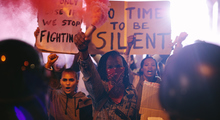Ways to overcome unique challenges of officer-involved domestic violence
- Nov 23, 2020
- By Stephanie Thurrott
Nanette Chezum knows what it’s like to face domestic violence with an abuser who’s a police officer. In early 2015 she began dating a law enforcement professional. Soon after, he started speaking to her in a commanding tone that made her uncomfortable.
“It quickly escalated to sarcasm and snarky comments,” she says. “When I would speak up, defend myself or call attention to issues, he would quickly shut me down. He would flip it back onto me and make it seem like the problems were my fault.”
One day, they were eating in a restaurant and people at another booth were annoying him, so he wanted to leave. Chezum was eating her salad and he insisted she have it boxed up to go.
“We walked to the parking lot and when the car doors closed, he told me in the future I need to do what he says. He was yelling at me and pounding his fist on the steering wheel. It scared me. I had a physical reaction internally to what he was doing. My whole entire body started shaking,” she says.
Sign up for emails
Receive new and helpful articles weekly. Sign up here.
The relationship ended after seven months and to vent and process her feelings, Chezum drafted an email to her ex-boyfriend’s chief of police. She didn’t send it at first. “In February 2016 something came over me. I couldn’t move forward in healing. I was still ruminating. I sent the email off to the chief. I felt very empowered and relieved,” she says.
At the time Chezum thought that domestic violence only involved physical abuse. Plus, she had connected online with other women who were abused by law enforcement officers whose stories weren’t believed. So she didn’t expect a response.
But a week later, an investigator from a neighboring county reached out to let her know they were opening an inquiry. “I met with that investigator for an hour and a half and talked about every incident and every tactic I could think of. When I left that meeting, I felt a giant sense of relief, like, ‘Wow, somebody who has power and control over my perpetrator knows now what he’s like behind closed doors.”
Chezum chose not to read the investigator’s final report, knowing that the manipulations, lies, and half-truths her ex-boyfriend shared wouldn’t support her healing. “I didn’t want to be angry anymore,” she says.
Her ex separated from the police department in July 2017 and Chezum says no longer works as a law enforcement officer. “I have always suspected that he had other issues within the department that they were investigating and that I was one more piece to the puzzle,” she says.
These Survivors Face Additional Barriers
Unlike Chezum, many survivors of officer-involved domestic violence never get a chance to report what they went through. “I’ve heard from multiple women who were turned away from services at shelters when they mention the perpetrator is in law enforcement. It squashes any hope they might have at all. They slink away,” Chezum says.
Diane Wetendorf has worked diligently as an advocate for the last 30 years helping survivors of officer-involved domestic violence, while helping police departments develop policies to address it within their departments. At 68, she’s retired now and says, in part, it was because she got burned out trying to make significant change within this niche of domestic violence.
“You have to look at the police culture. The police really do not police themselves,” says Wetendorf.
For survivors, she says, “There’s often no such thing as escaping because police have access to online information and databases—they can chase all that. It’s nearly impossible to hide … there are a million ways now [to find someone] using technology. I know it sounds hopeless, and as far as using the system, it pretty much is.”
By “the system,” Wetendorf means turning to law enforcement. But even using the shelter system isn’t always guaranteed to be safe.
“Shelters work closely with police, and police can even be on their board of directors,” she says, in her opinon, a clear conflict of interest.
Cops as Abusers are Especially Dangerous
“The qualities that make a police officer good at his job are the very things that make him a dangerous abuser,” says Wetendorf, something echoed by Mark Wynn, former police officer-turned-consultant, lecturer and advisor who helps train police around the globe how to respond to family violence.
“When you look at a profile of a police officer today, they’re trained to overcome aggression, they’re trained to use firearms, they’re trained in fighting skills. When you train someone in all these skills and they’re already an abuser you’ve just created a superpredator,” Wynn says.
Police often:
- Have access to weapons
- Know where shelters are located
- Are connected to others in law enforcement that the survivor might call for help
- Have more access to tracking people, blocking people from getting support, and burying a case
- May “prep” their coworkers for what the survivor might say
“Often, the officer starts to prep fellow coworkers,” Chezum says. “They say, ‘She’s acting unhinged and crazy. She’s saying things that don’t make sense.’ When they show up on the scene, they have that seed planted in their minds that the victim’s not acting right.”
And if law enforcement agencies start sanctions against the abuser, that could put the survivor in more danger.
Barriers are even higher when we look at intersectional identities. “If the individual or their partner is from a marginalized community, if they are a woman of color, an LGBT person, or from any other marginalized identity, they may feel more pressure to not bring these topics forward because they will bring more attention to those identities,” says Tonya Lovelace, global intersectional thought leader with 25 years experience in ending gender-based violence.
“They may feel it targets them further, and potentially their partner if they too are in the margins, reinforcing their need to remain silent.”
How Can Survivors Get Help?
“With these kinds of cases there needs to be immediate intervention because of the skill of the offiender,” Wynn says. That could mean reaching out to an advocate, shelter or legal organization.
However, often times, that’s easier said that done, as Wetendorf pointed out earlier. The better bet is to escape before things escalate to a dangerous level.
“The problem is, once you’re in a relationship, you’re already headed down that path,” she says. When something feels off in a relationship, invdividuals should listen to their gut. These 25 Relationship Red Flags can also predict danger.
And when a survivor realizes they’re in danger, getting out should be done very carefully.
Some years ago, Wetendorf created an amended safety plan specifically for survivors of officer-involved domestic violence, juxtaposing a traditional safety plan with the special cirucmstances these survivors need to consider. For example:
Standard Safety Plan: Decide whom you will inform of your situation. This could include your school, work location or residence security. Provide a picture of your abuser if possible.
Officer-Involved Domestic Violence Survivor: Alert them that he is a police officer and may use his professional status or other police officers to gain access to you or your children. He may appear in uniform to mislead or intimidate them.
Survivors can also ask advocates to reach out to police departments on their behalf. The advocate can then ask what protocols are in place for officer-involved domestic violence without revealing the survivor’s identity. They can find out what types of protection are available.
“These advocates can help survivors think through their options,” Lovelace says. They can help you connect with social services and walk you through court and other legal proceedings. “Advocates really are amazing supports and free resources to survivors,” she says. “Culturally specific and population-specific advocates can assist those on the margins with even greater access and understanding of their specific stakes and circumstances.”
How Family and Friends of Survivors Can Help
If your loved one is surviving officer-involved domestic violence, there are five key things you can do.
Believe them. People in law enforcement are seen as public figures, and you may view the abuser as an upstanding citizen. “It becomes very daunting for a survivor to believe that anyone will believe them,” Lovelace says. “If someone is reaching out, understand that they are really taking a risk hoping that they can trust you and they are seeking support.”
Listen to what they want. “Survivors know what’s best for their own experience,” Lovelace says. Acting beyond what they ask for can make them more vulnerable.
Let them lead. When you provide information, allow the survivor to receive it the way they feel is necessary. “If you printed something out and they don’t take it, don’t identify that as them not listening. Having that material could create additional destabilization and make them unsafe,” Lovelace says.
Be there for them for whatever they need, as often as they need. Leaving may not be what they want to do. And even if they do want to leave, it can take four to seven tries on average, Lovelace says.
Be aware of risks. Deciding to reach out to law enforcement or to the chief of police can be risky, especially for people of color and marginalized people.
Make a Donation
It is easy to ignore this message. Please don’t. We and the millions of people who use this non-profit website to prevent and escape domestic violence rely on your donations. A gift of $5 helps 25 people, $20 helps 100 people and $100 helps 500 people. Please help keep this valuable resource online.
- $5
- $20
- $100
As an Advocate, What Can I Do?
First, recognize that these abusers are different. “It takes a careful advocate and a well-thought-out plan to get someone to safety,” Wynn says.
You can also work toward change in your community. “Law enforcement is traditionally a very patriarchal institution,” Chezum says. “Gender bias, sexism and misogyny are huge barriers when it comes to creating change within those institutions.”
Communities should have protocols in place for a coordinated community response to address officer-involved domestic violence. Someone in the police department can be dedicated to supporting survivors whose partners are in law enforcement.
If your community doesn’t have a protocol in place, start developing one. “Before a survivor walks into your facility, reach out to and work more closely with law enforcement to come up with a safety plan,” Chezum says. “What safety measures can you put in place?”
- Review Diane Wetendorf’s Annotated Safety Plan for OIDV Survivors.
- This guide for advocates from the Battered Women’s JUSTICE Project can help.
- The International Association of Chiefs of Police shares its model policy on domestic violence, which includes information on officer-involved domestic violence.
- Wynn shares a podcast episode from the Partnered with a Survivor Series that covers the fight against domestic violence by police officers.
To learn more on this topic, read, “When Your Abuser Is a Police Officer.”
Related Articles
-
Calling the Police Shouldn’t Be Another Barrier
-
Customizing Your Safety Plan
-
Don’t Use Domestic Violence Victims to Derail Police Reform
-
Ignoring Abuse By a Police Officer
-
When Your Abuser is a Police Officer
Content retrieved from: https://www.domesticshelters.org/articles/escaping-violence/my-abusive-partner-is-also-a-cop.





